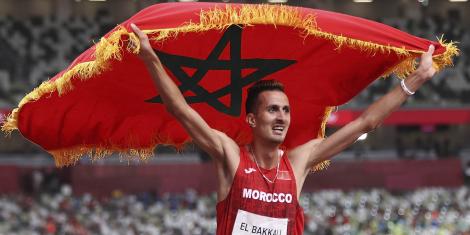
Moroccan Olympic steeplechase champion Soufiane El Bakkali has confirmed his participation in the men’s 3,000m steeplechase at the Kip Keino Classic Tour at Kasarani Stadium on September 18, 2021.
During the recently concluded Tokyo Olympics, Bakkali won a gold medal clocking 8:08.90. This made him the first non-Kenyan to win the Olympic gold medal in the 3,000 metres steeplechase since Poland’s Bronisław Malinowski won the title in Moscow in 1980.
Kip Keino Classic director Barnabas Korir, who confirmed Bakkali’s entry, stated that the Moroccan has always expressed his desire to train and compete in Kenya, a country he admires for its rich distance running tradition.
“We are happy that El Bakkali has chosen to come and finish his great season at the Kip Keino Classic, and we look forward to a competitive race between him and his Kenyan rivals now that he is the Olympics defending champion.
In the past, the Moroccan was unlucky in the Rio Olympics in 2016 where he finished fourth. And in the 2019 World Championship in Doha, he settled for a bronze medal behind former Olympic champion Conseslus Kipruto.
After his win in Tokyo, he admitted to undergoing many years of frustration at the hands of his East African contenders.
“I am used to seeing Kenyan people win, it’s a big accomplishment for me. I have been aiming for this for years, and this was my opportunity to show that Morocco is capable of winning the prize in front of the Kenyans,” stated Bakkali.
The 3,000m steeplechase has been Kenya’s domain since 1968 when Amos Biwott won the ground-breaking gold at the Mexico Games.
The only time Kenya did not feature on the top of the podium was at the 1976 Summer Olympics in Montreal when Kenya among other African countries boycotted the games in protest against the participation of New Zealand by the International Olympic Committee.This is because their country’s rugby team had toured South Africa despite the Soweto uprising, which led to the deaths of hundreds of black protesters.
